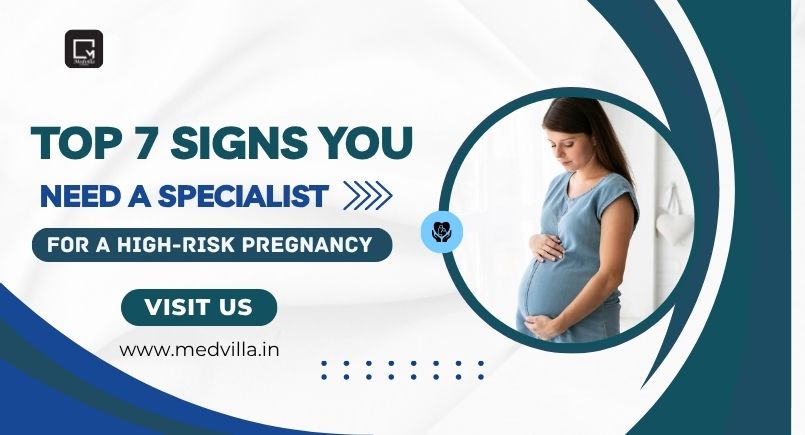Top 7 Signs You Need a Specialist for a High-Risk Pregnancy

Pregnancy is a beautiful and transformative journey, but not all pregnancies follow a smooth path. Some expectant mothers face medical conditions or complications that categorize their pregnancy as high-risk. In such cases, specialized care is crucial to ensure the safety and health of both the mother and baby.
But how do you know when your pregnancy requires the attention of a maternal-fetal medicine (MFM) specialist or a gynecologist trained in high-risk care?
In this article, we’ll explore the top 7 signs that indicate you may need to consult a specialist for a high-risk pregnancy — helping you make informed decisions for your health and that of your growing baby.
1. Pre-Existing Medical Conditions
If you have a pre-existing health condition, your pregnancy is automatically at a higher risk. Some common conditions that warrant specialist attention include:
- Diabetes (Type 1 or Type 2)
- High blood pressure
- Heart disease
- Kidney disorders
- Thyroid problems
- Autoimmune diseases like lupus or rheumatoid arthritis
These conditions can affect your baby’s development and increase the risk of complications like preterm labor, miscarriage, or fetal growth restriction. A specialist can manage both your underlying condition and your pregnancy simultaneously, minimizing risks.
SEO Tip: Search terms like pregnancy with diabetes, high blood pressure during pregnancy, or autoimmune diseases in pregnancy are commonly searched by expectant mothers.
2. You’re Over 35 or Under 17
Maternal age plays a significant role in determining pregnancy risk. Women who are:
- Over the age of 35 (often referred to as advanced maternal age), or
- Teenagers under 17
are more likely to experience complications such as:
- Chromosomal abnormalities (e.g., Down syndrome)
- Miscarriage
- Gestational diabetes
- Preeclampsia
- Preterm delivery
If you fall in this age group, it’s advisable to consult a high-risk pregnancy specialist who can closely monitor your pregnancy with advanced screenings and interventions.
Also Read: Early Signs of Pregnancy Every Woman Should Know
3. History of Pregnancy Complications
If you’ve had complications in previous pregnancies, your current pregnancy may also be considered high-risk. Such complications include:
- Preterm labor or preterm birth
- Miscarriage or stillbirth
- Preeclampsia or eclampsia
- Placental abruption
- Intrauterine growth restriction (IUGR)
These past issues often indicate a higher likelihood of recurrence. A specialist will monitor you more frequently and may recommend medications or lifestyle changes to prevent recurrence.
4. Multiple Pregnancies (Twins, Triplets, etc.)
Carrying more than one baby increases the risk of pregnancy complications such as:
- Preterm labor
- Gestational hypertension
- Twin-to-twin transfusion syndrome (in identical twins)
- Low birth weight
- Cesarean delivery
High-order pregnancies require more ultrasounds, special monitoring, and expert prenatal care to detect complications early. A maternal-fetal medicine expert will guide you on proper nutrition, rest, and timely delivery planning.
SEO Keywords to Include: pregnancy with twins, multiple pregnancies risks, high-risk pregnancy doctor for twins
5. Abnormal Screening or Ultrasound Results
Routine prenatal tests such as NT scans, anomaly scans, or genetic screenings may reveal:
- Structural defects in the fetus
- Soft markers for genetic syndromes
- Placenta previa or low-lying placenta
- Abnormal amniotic fluid levels
- Fetal growth abnormalities
These findings require immediate evaluation by a specialist who can recommend further diagnostic testing like amniocentesis or chorionic villus sampling (CVS), and provide guidance on how to proceed.
6. Gestational Diabetes or Preeclampsia
Two of the most common complications during pregnancy are:
Gestational Diabetes:
- Develops in the second or third trimester
- Can cause large baby size (macrosomia), preterm birth, or stillbirth
- Requires strict diet, sugar monitoring, and possibly insulin
Preeclampsia:
- Characterized by high blood pressure and protein in urine
- Can lead to organ damage, seizures (eclampsia), or placental abruption
Both conditions significantly raise pregnancy risk and demand specialized medical management. Delaying consultation can result in life-threatening complications for mother and baby.
7. You Experience Warning Symptoms During Pregnancy
If you face any of the following symptoms, it’s a red flag that you need immediate attention — possibly from a high-risk pregnancy expert:
- Severe abdominal pain
- Heavy vaginal bleeding or watery discharge
- Severe headaches or blurred vision
- Sudden swelling of hands, feet, or face
- Decreased fetal movements
- Persistent vomiting or dehydration
These symptoms may signal issues such as placental abruption, preterm labor, infection, or even pregnancy loss. A specialist can conduct advanced testing and hospital-based care, which can be life-saving.
When Should You See a High-Risk Pregnancy Doctor?
You should consider seeing a maternal-fetal medicine (MFM) specialist or a gynecologist experienced in high-risk obstetrics if:
- You have any of the signs above
- Your obstetrician recommends a referral
- You need second opinions on screening results
- You want specialized monitoring throughout pregnancy
Often, you’ll work in tandem with your regular OB-GYN and an MFM expert to ensure comprehensive care.
Benefits of Consulting a High-Risk Pregnancy Specialist
- Early detection of fetal or maternal complications
- Access to advanced imaging and diagnostics
- Expert care during labor and delivery
- Personalized treatment plans and emergency protocols
- Reduced risk of preterm labor, miscarriage, or C-section
Final Thoughts
Every pregnancy is unique, and while most proceed without complications, certain signs indicate the need for specialist intervention. If you’re experiencing any of the top 7 signs mentioned above, don’t delay in seeking care from a high-risk pregnancy specialist. Timely diagnosis, regular monitoring, and expert guidance can make a significant difference in both your experience and the health outcomes for you and your baby.
Your body is doing something incredible — growing life — and it deserves the best possible support during this delicate journey. To know more consult with the best gynecologist in Gomti Nagar Lucknow